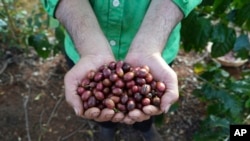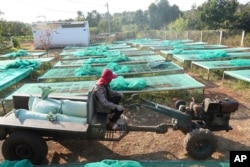Le Van Tam is no stranger to how the vagaries of global trade determine the fate of small coffee farmers like him.
He first planted coffee in 1995 on a piece of land outside the city of Buon Ma Thuot in Vietnam’s central plateau region. Over the years, his focus has been on quantity, not quality. Tan uses large amounts of fertilizers and pesticides to boost yields, and global prices determine his output.
Then, in 2019, he took a more sustainable approach and turned his coffee fields into sun-dappled forests, working with Le Dinh Tu of Aeroco Coffee, an organic exporter in Europe and the United States. Coffee grows alongside tamarind trees, which add nitrogen to the soil and provide support for the black pepper vines. Grass helps keep the soil moist, and the mix of plants prevents pest outbreaks. Chili peppers also boost Tan’s income.
“Production has not increased, but the value of the product has increased,” he said.
In the 1990s, Tam was one of thousands of Vietnamese farmers who planted more than 1 million hectares of coffee, mostly robusta, to take advantage of high global prices. By 2000, Vietnam had become the second largest coffee producer, with coffee accounting for one-tenth of its export revenue.
Vietnam hopes farmers like Tam will benefit from a possible reordering of the way coffee is traded, as European laws to curb deforestation become more stringent.
The European Deforestation Regulation (EUDR) will ban the sale of products such as coffee from December 30, 2024, if companies cannot prove that these products are not linked to deforestation. The new rules are wide-ranging: they will apply to cocoa, coffee, soybeans, palm oil, wood, rubber and cattle. In order to sell these products in Europe, large companies must prove that they come from land whose forests have not been cleared since 2020. Small companies have until July 2025 to do so.
Deforestation is the second largest source of carbon emissions after fossil fuels. According to a 2021 WWF report, Europe ranked second in deforestation caused by imported timber in 2017, after China. Helen Bellfield, policy director at Global Canopy, told The Associated Press that if implemented properly, the EUDR could help reduce this, especially if stricter standards for tracking product origins become the “new normal.” .
It’s not foolproof. Companies can sell products that don’t meet the new requirements elsewhere without reducing deforestation. Thousands of small farmers unable to provide potentially expensive data could be excluded. Belfield said much will depend on how states and companies respond to the new law. Countries must help small farmers by establishing national systems that ensure the traceability of their exports. Otherwise, companies may only buy from large farms that can prove they comply with regulations.
Orders for Ethiopian-grown coffee have declined. Peru lacks the capacity to provide the information needed for coffee and cocoa grown in the Peruvian Amazon.
In addition, Vietnam faces other challenges, including increasing drought and declining groundwater levels.
“There will be winners and losers,” she said.
Vietnam cannot afford losses – Europe is its largest coffee market, accounting for 40% of its coffee exports. Six weeks after the EUDR was approved, Vietnam’s Ministry of Agriculture began working to prepare coffee-growing provinces for the shift. It has since launched a national program that includes a database of where crops are grown and mechanisms to make this information traceable.
The Southeast Asian country has long promoted more sustainable agricultural methods and views laws such as the EUDR as “inevitable changes,” according to an August 2023 Ministry of Agriculture bulletin. Agriculture Minister Le Minh Hoang said the EUDR could help accelerate this transition.
Tam and his export partner Tu adapted quickly.
Tu said they can get better prices for high-quality coffee, even if the cost is higher.
“We have to choose the highest quality. Otherwise, we will always be laborers,” Tu said, while sipping a cup of his favorite coffee at his company’s coffee processing plant adjacent to Tan Farm. Truckloads of red coffee cherries, including robusta and arabica, arrive here from other farms, the pulp is removed and the beans are placed on tables to dry in the sun.
Tu has received a certificate from the International Sustainable Development Agency, which will enable him to deal with the EUDR. David Hadley, director of the regulatory impact program at Preferred by Nature, a Costa Rican nonprofit, said such certificates typically address deforestation, although some adjustments may be needed.
Ensuring that Vietnam’s roughly 500,000 smallholder farmers, who produce about 85% of Vietnam’s coffee, can collect and provide data proving their farms are not contributing to deforestation remains a challenge. Some people may have difficulty using their smartphones to collect geolocation coordinates. Loan Le of International Economic Consultants said small exporters need to put in place systems to prevent other uncertified products from being mixed with EUDR-compliant coffee.
Farmers also need documentation to prove they are complying with state land use, environmental protection and labor laws, Le said. Additionally, coffee’s long value chain – from producing the beans to collecting and processing them – requires digital systems to ensure error-free records.
Global Canopy’s Bellfield said Brazil, the world’s largest coffee producer, is in a better position because its plantations are far from forests and it has a relatively well-established supply chain. Furthermore, according to a 2024 Brazilian study, coffee grown in Brazil is most likely to meet EUDR requirements because most of it is exported to the EU, Brazil has fewer small farmers, and about one-third of its coffee-growing area is already in some way Sustainability certification.
The EUDR acknowledged concerns about ill-prepared suppliers, giving them more time, and said European governments would work with affected countries to “achieve the transition” with “particular attention” to the needs of small farmers and indigenous communities. The 2028 review will also look at the impact on small farmers.
“Despite this, we still expect high costs and difficulties for smallholder communities,” she said.
In Peru, it is difficult to collect information on hundreds of thousands of small farmers because of weak institutions in the country and a lack of land ownership for most farmers, according to a study on the impact of the EUDR by the Amazon Business Alliance, a joint initiative of USAID and Canada. and nonprofit Conservation International.
Ethiopia’s coffee accounts for about a third of total export revenue, according to a U.S. Department of Agriculture report, but the country has been slow to respond. Ethiopian Coffee Exporters Association president Gizat Worku said the national plan launched in February 2024 failed to solve the fundamental problem of how to collect the required data from millions of small farmers and provide this information to buyers.
“It requires a lot of resources,” he said
Gizzate, who like many Ethiopians are on a first-name basis, said orders were falling amid doubts about the country’s ability to comply with the EUDR. He said some traders were considering turning to other markets, such as the Middle East or China, where Ethiopian coffee is “booming”. But switching markets isn’t easy.
“These regulations will have a huge impact,” Gizzate said.
Follow us on Google news ,Twitter , and Join Whatsapp Group of thelocalreport.in


















